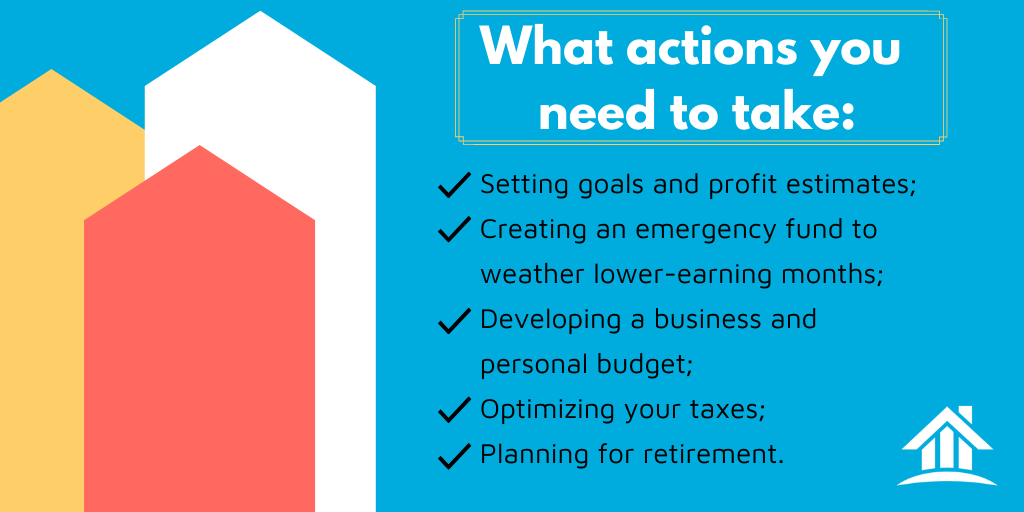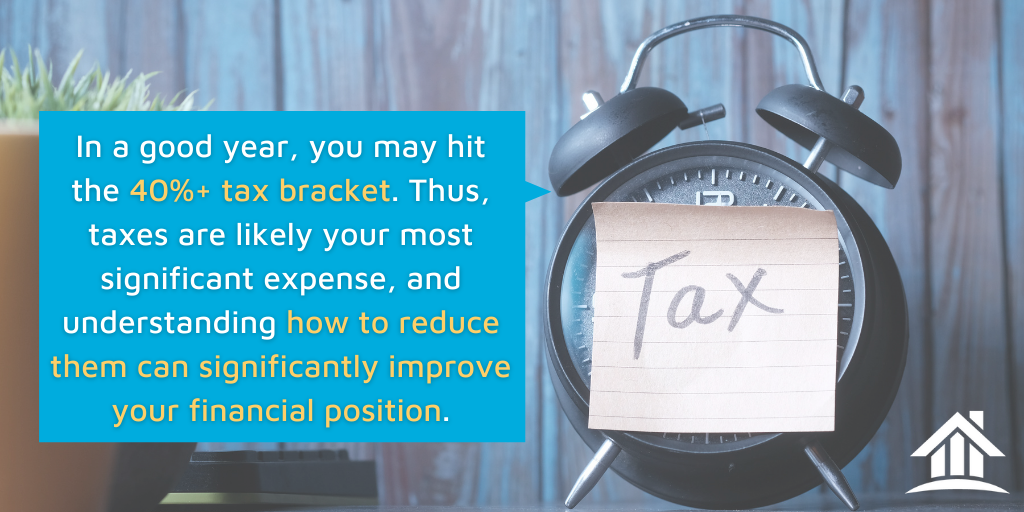
As a real estate agent, you don’t only help homebuyers and sellers with their property but also run a business. This includes marketing, consultations, and managing finances.
When you go from showing to showing and push yourself to reel in more leads, you can easily forget that one of the backbones of your business is the financials. If you don’t properly manage your finances as a realtor, it could result in unforeseen costs or other consequences that can hurt both your personal and business bottom lines.
In this article, we look at five areas to consider when contemplating the financial health of your personal and business life as a real estate agent.

Goals are essential to a successful real estate business, and the first step to managing your realtor financials is setting a financial goal.
This includes how much you want to earn in the next 12 months and, ultimately, how many deals will it take to hit that goal? From there, you can make more detailed plans, such as how many leads you need to generate to hit that many closed deals.
You should further create goals on how much money you want to save and invest and whether you hope to derive income from other sources, such as property management or real estate investing. This lays the foundation for your budget later on.
Some months, you may be out and about all day and complete administrative tasks late into the evening. Other months, you’re at home waiting for someone to call. Generally, how much you make is correlated to how busy you are as a real estate agent. And, it’s only natural that you’ll have up and down months.
To accommodate such a lifestyle, agents need to budget for good and bad seasons. Otherwise, you’re left feeling like a millionaire some months and eating rice and beans the next. Consider the beginning of COVID-19 when the real estate market came to a halt. It’s likely many real estate professionals dug into their emergency funds during that time.
Creating an emergency fund ultimately lets you balance out the highs and lows. An emergency fund is common so that employees have a safety net if they’re ever fired or let go from their role. It usually consists of three to six months’ worth of expenses in a liquid savings account (i.e., not invested in cryptocurrencies or tied up in a GIC). But realtors can benefit from a larger fund — effectively double or six to twelve months of expenses.
If you can’t make a mortgage payment or rent, you’ll have this emergency fund ready for at least half a year. This emergency fund should include the expenses you may have from your business, such as advertising and car costs, as well as your personal life. Once you return to a more robust month, you can replenish any savings you spent to prepare for the next possible dry spell.
Although it’s tempting to simplify your life and use one bank account and budget for everything, it’s not a best practice. Things can get tangled and confused with money coming in and out. And if you haven’t adequately recorded your business income and expenses, it can get tough to fish them out for tax season.
This is why you should have a separate bank account and budget for your personal and business life. Once you receive a commission cheque, it should first go into your business account, and then you can pay yourself by transferring what you need to your personal account — after taking taxes and expenses into account, of course.
Keeping these two books separate has other benefits. It allows you to track your business and personal expenses and understand where your money is going. Things such as coffees on-the-go or gas can quickly add up, and realizing you can cut out certain things can mean more money in your wallet.
Apps such as Mint or Mvelopes are great ways to track your personal spending, while software such as FreshBooks or QuickBooks can track your business income and expenses, prepare your invoices, and ready you for tax season.

While it may seem cost-efficient to do your taxes yourself and opt out of paying an accountant, an accountant better understands what you can and cannot expense. Commonly, paying an accountant to file your returns can create a strong return on investment via a tax refund.
Self-incorporation can also have numerous tax benefits. It allows you to keep profits in your corporation, so you can defer partial tax payments until you’re in a year where your tax bracket is lower. You can even take the money out once you retire, as you likely won’t have other income to drive up your tax bracket during this time. However, rules regarding real estate corporations vary from province to province, and it’s best to speak to your lawyer or accountant to understand more.
As mentioned in the last section, self-incorporation can be a great retirement tool. A professional incorporation allows you to keep money in the business, and you can then withdraw this money when you retire or wind down your real estate practice.
The Canadian government also provides the Tax-Free Savings Account (TFSA) and Registered Retirement Savings Plans (RRSP) as ways to save for retirement. These vehicles let you grow your money tax-free, so you aren’t stuck paying a hefty capital gains tax bill. You can further deduct any contributions to your RRSP from your income. As a realtor, you need to understand your personal and business finances. They’re effectively the backbone of your career and personal life. As a self-employed individual with inconsistent month-to-month revenues, these tips can hopefully help you plan for the worst and ensure you make the most of your profits.